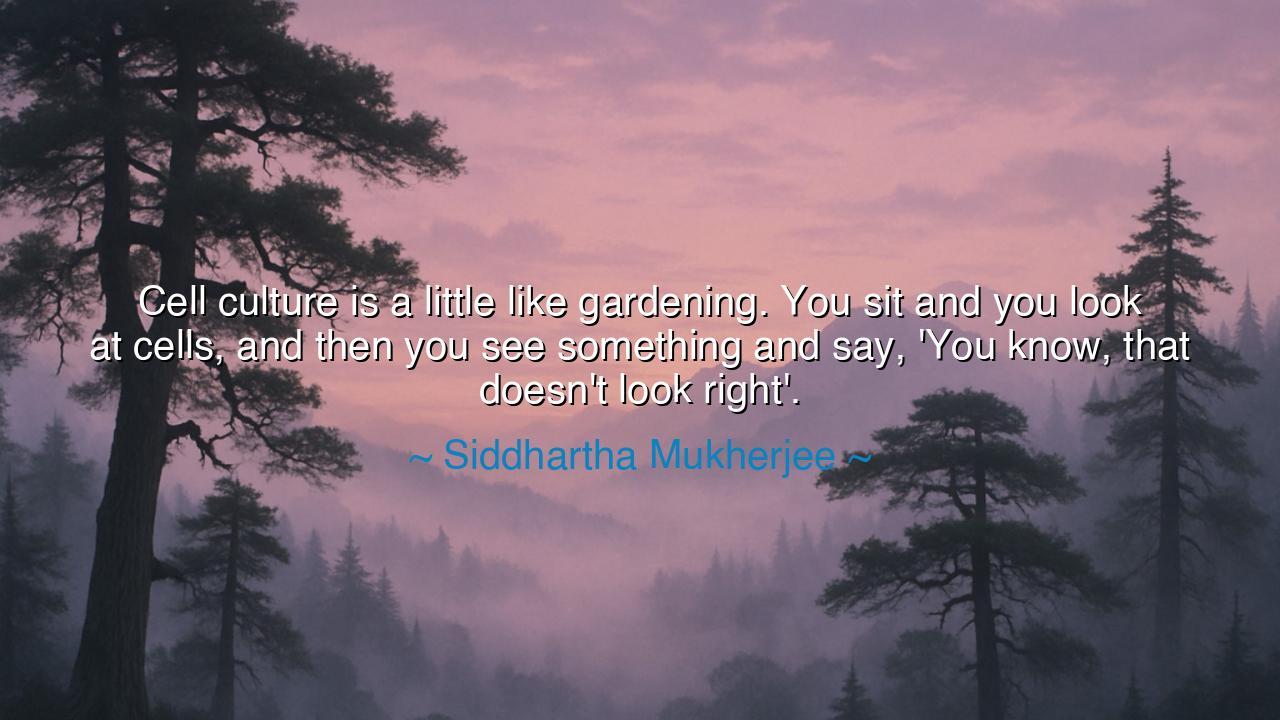
Cell culture is a little like gardening. You sit and you look at
Cell culture is a little like gardening. You sit and you look at cells, and then you see something and say, 'You know, that doesn't look right'.






O Seekers of Truth, gather close and hear the profound words of Siddhartha Mukherjee, for in his reflection on cell culture, there lies a wisdom that reaches beyond the laboratory and into the heart of human experience. "Cell culture is a little like gardening," he says. "You sit and you look at cells, and then you see something and say, 'You know, that doesn't look right.'" At first glance, this might seem a simple comparison, but within it lies a deeper truth about the art of observation, the importance of patience, and the delicate balance between nature and intervention. Just as a gardener watches over the soil, tending to the smallest signs of growth or decay, so too does the scientist labor in silence, watching and waiting for the moment when something in the environment shifts, revealing that which was once hidden.
In the ancient world, the wise were not those who acted impulsively, but those who cultivated the ability to observe the world around them with clarity and patience. The philosopher Aristotle was known for his meticulous observations of nature. He did not rush to conclusions but patiently examined the smallest details of the world, understanding that truth lay not in haste, but in the careful, sustained effort to understand the processes at work. Much like a gardener who tends to their plants with careful attention, Aristotle knew that the smallest shift in nature—the curl of a leaf, the movement of a shadow—could reveal great truths. Mukherjee's words remind us that science, like gardening, requires patience, vigilance, and an unwavering commitment to understanding what lies beneath the surface.
The act of observing cells, much like observing a garden, is one of deep attentiveness. When Mukherjee speaks of noticing when something “doesn’t look right,” he is calling attention to the moment of awareness, that instant when the gardener or the scientist recognizes that the natural flow of things has been disrupted. In the garden, it might be the appearance of pests, the withering of a leaf, or the sudden fading of color. In the world of cells, it might be a shift in their behavior, an unusual growth pattern, or an unexpected reaction. Both require a trained eye, a deep understanding of the environment, and the ability to discern what is out of place. It is in these moments of subtle disruption that the greatest discoveries often arise.
Consider, if you will, the ancient story of Galileo, the great scientist and observer of the heavens. Galileo did not simply accept the conventional wisdom of his time but gazed at the stars with a critical eye. He observed the night sky not as a passive witness, but as a seeker of hidden truths. Through his telescope, Galileo saw what others had missed, and in doing so, he altered the course of human understanding. Much like the scientist who observes cells, Galileo’s work was a careful study of nature, where patience and attention led to the unraveling of mysteries that had long remained veiled. Mukherjee’s approach to cell culture mirrors this same spirit of inquiry—patient, deliberate, and keenly attuned to the nuances of the world around him.
Yet, just as the gardener intervenes when something appears wrong—removing pests or adjusting the soil—so too must the scientist take action when the cells reveal a discrepancy. There is no passive observation in science or gardening. Both require action. The gardener must prune the branches that hinder growth, while the scientist must intervene when the cells begin to grow uncontrollably. Mukherjee's comparison highlights the critical balance between careful observation and timely intervention. Just as the gardener must know when to let nature take its course and when to step in, so too must the scientist know when to allow the cells to develop on their own and when to address the anomalies that arise.
So, O Seeker, the lesson here is clear: both gardening and science require the art of observation, the ability to perceive the subtle changes in nature that others might miss. But it is not enough to simply observe. The true challenge lies in recognizing when something is wrong, when the natural order has been disturbed, and taking the necessary steps to correct it. Whether in the garden or in the laboratory, the work of the observer is one of patience, awareness, and action. It is through these qualities that we move from ignorance to understanding, from chaos to order.
In conclusion, let the wisdom of Mukherjee’s words guide you: be ever watchful, ever attentive to the world around you. Whether tending to the earth or examining the smallest cells of life, know that the key to discovery lies in your ability to notice the smallest signs of change. Do not rush to conclusions, but observe with a discerning eye. And when the time comes, act decisively. In this balance of patience and action, both in the garden and in life, you will uncover the hidden truths that lead to greater understanding. May your own journey of observation and discovery bring you closer to the mysteries of the world, just as the gardener and the scientist are drawn closer to the beauty and complexity of nature.






AAdministratorAdministrator
Welcome, honored guests. Please leave a comment, we will respond soon